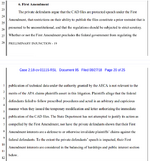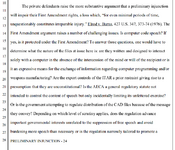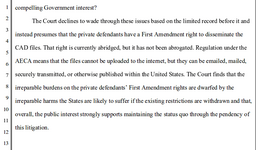- Messages
- 6,824
- Reactions
- 17,613
I went down to the Federal Courthouse in Seattle today to watch the oral arguments in the latest saga involving Defense Distributed and CAD files. I cannot adequately express exactly how banal the whole proceeding was, which is quite shocking considering the magnitude of the rights that are at stake.
An Assistant Attorney General -- forgot his name -- argued first on behalf of the states. The judge tossed him a couple softball questions and one decent one. One of the CFR provisions requires the State Department to give Congress 30 days notice of rule changes (that's it, just notice -- there are no consequences spelled out if this is not followed). The judge did ask the AAG whether at this point, nearly 30 days having elapsed since the suit was filed, whether Congress had received notice -- it was more in the form of thinking out loud though my memory could be inaccurate, at least I don't recall the AAG responding in any memorable fashion (I wasn't taking notes though -- I was just listening).
The attorney for the Federal Government went next -- the judge absolutely peppered him with questions the entire time and seemed really focused on trying to root out why the State Department settled. The Fed's attorney basically said it was not appropriate to go into that or how high up the chain of command the decision was made at. I'm thinking they read the 5th Circuit case where in her dissent, one of the judges laid out breadth and depth of the government's abuse of the 1A.
The meat of the Fed's case is that the states do not have the right to interfere in the decisions the Federal Government makes about export control -- that subject is in the sole discretion of the Executive Branch, the states are free to do whatever they feel they ought to inside their borders, and the whole 30 day notice to Congress thing is a red herring because no items in the list were removed (think of "items" as heading categories under which there are individual named things below each "item") and thus no need for notice to Congress at all.
The attorney for DD, SAF and the rest, was in a sort of strange spot because these private entities are not actually parties to the suit. This lawsuit is between the state AGs and the Federal government. He did try to give the judge a way to provide at least a partial win for DD etc.: should the judge decide to extend the injunction he pointed out that there are actually four topics at issue: files already released, files that could be released, ________ (I forget number 3), and a blanket "other things" topic. He suggested the court had to do a separate balance test for each of these topics rather than just do a blanket injunction without examining each.
The AAG for the States spoke last in rebuttal, and grossly thanked the approximately 12 Moms Demand Action shirts in the crowd. He basically engaged in some fear mongering about plastic guns as he did in his first presentation, how terrorists could ship them to America, blah blah blah (Judge could have asked: why wouldn't a terrorist just make them here and save the hassle of border crossing, why wouldn't a terrorist make them out of metal right here so they actually work?). The sum of his argument was "The Government should be able to regulate information if the information could be used in dangerous ways." That's pretty breathtaking for there is almost no information of any value or any vintage that cannot be used irresponsibly or dangerously. Teaching someone how to hit a baseball with a bat or pound a nail with a hammer (stuff any Neanderthal surely knew about in principle) -- even that knowledge could be put to dangerous usage (and arguably, it actually is much more dangerous when you compare murders by blunt force to murders by all-plastic 3D printed guns).
At the end, the judge said he wished the Executive and Legislative branches would handle this issue and that dumping it on the judicial branch was unfair, but in any event, he'd issue a written decision on the 27th (I think at least -- he will issue the decision the day before the current Temporary Restraining Order expires).
As I said in the beginning though, for the important scope of this issue -- freedom of expression is a bedrock American value -- the banality of the hearing was shocking. The judge barely even questioned a word the States' AAG said. For example: the AAG complained about how prisons would have to switch from metal detectors to other means of searching people. The judge could have asked: does a cartridge have enough metal to set of a metal detector -- will an xray pick it up? What good is a plastic gun without ammo? If a plastic gun without ammo is dangerous because it can be used to beat people, what about plastic knives -- the current system of screening won't pick those up, why aren't you worried about that when many killings in prison are by stabbing? Instead: *crickets*
Anyway, given how the judge let the states totally slide, I'm feeling less than optimistic. DD & SAF are holding a fundraiser to help out on this and other cases. It would be worth it if you can afford it: Defense (Contributed) | DEFCAD
An Assistant Attorney General -- forgot his name -- argued first on behalf of the states. The judge tossed him a couple softball questions and one decent one. One of the CFR provisions requires the State Department to give Congress 30 days notice of rule changes (that's it, just notice -- there are no consequences spelled out if this is not followed). The judge did ask the AAG whether at this point, nearly 30 days having elapsed since the suit was filed, whether Congress had received notice -- it was more in the form of thinking out loud though my memory could be inaccurate, at least I don't recall the AAG responding in any memorable fashion (I wasn't taking notes though -- I was just listening).
The attorney for the Federal Government went next -- the judge absolutely peppered him with questions the entire time and seemed really focused on trying to root out why the State Department settled. The Fed's attorney basically said it was not appropriate to go into that or how high up the chain of command the decision was made at. I'm thinking they read the 5th Circuit case where in her dissent, one of the judges laid out breadth and depth of the government's abuse of the 1A.
The meat of the Fed's case is that the states do not have the right to interfere in the decisions the Federal Government makes about export control -- that subject is in the sole discretion of the Executive Branch, the states are free to do whatever they feel they ought to inside their borders, and the whole 30 day notice to Congress thing is a red herring because no items in the list were removed (think of "items" as heading categories under which there are individual named things below each "item") and thus no need for notice to Congress at all.
The attorney for DD, SAF and the rest, was in a sort of strange spot because these private entities are not actually parties to the suit. This lawsuit is between the state AGs and the Federal government. He did try to give the judge a way to provide at least a partial win for DD etc.: should the judge decide to extend the injunction he pointed out that there are actually four topics at issue: files already released, files that could be released, ________ (I forget number 3), and a blanket "other things" topic. He suggested the court had to do a separate balance test for each of these topics rather than just do a blanket injunction without examining each.
The AAG for the States spoke last in rebuttal, and grossly thanked the approximately 12 Moms Demand Action shirts in the crowd. He basically engaged in some fear mongering about plastic guns as he did in his first presentation, how terrorists could ship them to America, blah blah blah (Judge could have asked: why wouldn't a terrorist just make them here and save the hassle of border crossing, why wouldn't a terrorist make them out of metal right here so they actually work?). The sum of his argument was "The Government should be able to regulate information if the information could be used in dangerous ways." That's pretty breathtaking for there is almost no information of any value or any vintage that cannot be used irresponsibly or dangerously. Teaching someone how to hit a baseball with a bat or pound a nail with a hammer (stuff any Neanderthal surely knew about in principle) -- even that knowledge could be put to dangerous usage (and arguably, it actually is much more dangerous when you compare murders by blunt force to murders by all-plastic 3D printed guns).
At the end, the judge said he wished the Executive and Legislative branches would handle this issue and that dumping it on the judicial branch was unfair, but in any event, he'd issue a written decision on the 27th (I think at least -- he will issue the decision the day before the current Temporary Restraining Order expires).
As I said in the beginning though, for the important scope of this issue -- freedom of expression is a bedrock American value -- the banality of the hearing was shocking. The judge barely even questioned a word the States' AAG said. For example: the AAG complained about how prisons would have to switch from metal detectors to other means of searching people. The judge could have asked: does a cartridge have enough metal to set of a metal detector -- will an xray pick it up? What good is a plastic gun without ammo? If a plastic gun without ammo is dangerous because it can be used to beat people, what about plastic knives -- the current system of screening won't pick those up, why aren't you worried about that when many killings in prison are by stabbing? Instead: *crickets*
Anyway, given how the judge let the states totally slide, I'm feeling less than optimistic. DD & SAF are holding a fundraiser to help out on this and other cases. It would be worth it if you can afford it: Defense (Contributed) | DEFCAD














